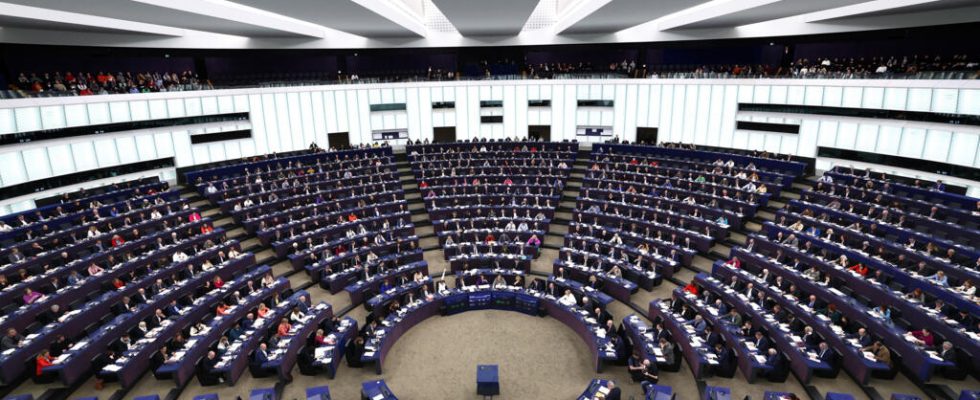This is the major issue of the election: the far-right parties are making a breakthrough in the polls. Two thirds of the member countries of the European Union are affected. What would be the consequences for the future of the Old Continent if the voters’ vote confirmed this announced wave? What would be the future of environmental, immigration or defense policies? This Monday, May 13, RFI is devoting a special day to the campaign for the European elections.
5 mins
“ These European elections are, without doubt, the most important since the beginning of this century. » The sentence is from the mayor of Lyon, the ecologist Grégory Doucet. Why would they be the most important? What are the issues at stake in the election? These elections are spread over four days from June 6 to 9: not all countries vote at the same time. Nearly 360 million European voters from the 27 member states of theEuropean Union must elect a total of 720 MEPs, or 15 more than in the current hemicycle in Strasbourg.
But these voters are faced with a choice: more or less Europe? More or less political integration between member countries? More or fewer common economic or environmental standards? European sovereignty or national sovereignty? This choice is essential because the Old Continent is the scene of an unprecedented rise in nationalism and far-right parties. They are at the head of voting intentions in nine countries of the European Union, such as in France the National Rally or in Italy Fratelli d’Italia of Giorgia Meloni. In nine other states, these parties rank second or third, such as the AfD in Germany or Chega in Portugal. In total, two thirds of the EU are affected by this potential nationalist breakthrough.
Also listenThe far right conquers Europe
Turn hard to the right in the Parliament of Strasbourg?
And if this breakthrough in voting intentions were reflected at the ballot box, what would be the consequences? First, the composition of the European Parliament would undergo a shift to the right while adding the seats of the classic right of the European People’s Party and the far-right MEPs. The latter are divided into two parliamentary groups in Strasbourg: on the one hand, the conservative reformist Europeans (ECR) led by Giorgia Meloni’s Fratelli d’Italia and the Poles of the Law and Justice Party (PiS), a party that is both neo -conservative defending above all the “values of Christian civilization” and pro-NATO. On the other side, the Identity and Democracy (ID) group, which brings together the National Rally, the Lega of Matteo Salvini, the PVV of Geert Wilders and the Germans of the AfD – this is an ultranationalist, anti-migrant and pro-Russian group, opposed above all to the deepening of the EU, starting with the possible integration of theUkraine.
Why would this shift be important for all Europeans? Because since 2009 andentry into force of the Treaty of Lisbon, the Strasbourg Parliament decides on an equal basis with the Member States, it is co-decision, particularly on questions of freedom, security and justice, on foreign trade, environmental policy or the common agricultural policy. Parliament approves the budget and has supervisory power over the European Commission.
A fortress Europe in “environmental pause”
The breakthrough of the far right on June 9 would therefore be decisive for the future of Europe. Starting with immigration policy. On April 10, the Strasbourg Parliament adopted the Asylum and Migration Pact, a text which organizes the screening of asylum seekers at the borders of the European Union and solidarity between Member States: either they agree to welcome migrants or they contribute financially to reception in the countries of arrival. This policy is not only rejected by certain States such as the Hungary and the Poland who do not want to welcome or pay, but it has also been judged too soft by the far right who no longer want any reception of foreigners on European soil.
Read alsoWhat is contained in the asylum and migration pact adopted by the European Parliament
Another major issue: environmental policy. After the environmentalist breakthrough in the last European election of 2019, theenvironment had become the EU’s priority with the launch of the Green Deal, the number one project of the President of the European Commission Ursula von der Leyen. Its objective: to achieve carbon neutrality in 2050. Today, the situation has changed: the anger of farmers against environmental standards has largely targeted the green pact and the time has come for an environmental pause.
Powerful Europe facing Russia in question
In these times of war Ukraine or to Gaza which can degenerate into global conflict, European defense has also become a major issue in these elections. Should we commit the 27 States of the Union to a “war economy”? Should we create a fund of 100 billion euros to support Ukraine militarily and financially? In the event of re-election of Donald Trump at the White House next November, should we not further pool the armies of EU countries? This integration, which is progressing, could be called into question. Europe as a geostrategic power against Russiathe notion is debated today, even within the European extreme right, sometimes pro-Russian sometimes pro-NATO.
But we must not forget the major concern of Europeans if we are to believe the Eurobarometer survey of the European Parliament at the end of 2023. To the question: “ Which issue would you like the European Parliament to take up as a priority? », a majority of Europeans surveyed respond: first, the fight against poverty and social exclusion, then public health. The climate emergency is the third concern. As for defense issues, they only come in 7th position and immigration only in 9th place. We must therefore not ignore the issue common to all of the approximately 360 million voters who will put their ballot in the ballot box between June 6 and 9: purchasing power and social cohesion.
